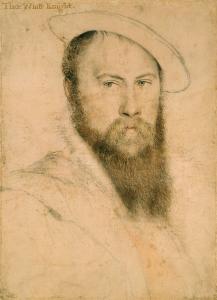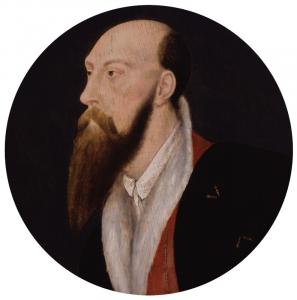Biography of Thomas Wyatt 1503-1542
Paternal Family Tree: Wyatt
In 1503 Thomas Wyatt was born to Henry Wyatt (age 43) in Allington, Kent.
In 1517 [his future brother-in-law] George Brooke 9th Baron Cobham (age 20) and Anne Braye Baroness Cobham (age 15) were married. He a great x 4 grandson of King Edward III of England. 

In 1520 Thomas Wyatt (age 17) and Elizabeth Brooke (age 17) were married. She a great x 4 granddaughter of King Edward III of England. 
In 1521 [his son] Thomas Wyatt was born to Thomas Wyatt (age 18) and [his wife] Elizabeth Brooke (age 18).
Life of Cardinal Wolsey. After that all these troublesome matters of my Lord Percy's were brought to a good stay, and all things finished that were before devised, Mistress Anne Boleyn (age 23) was revoked unto the court3, where she flourished after in great estimation and favour; having always a privy indignation unto the cardinal, for breaking off the precontract made between my Lord Percy and her, supposing that it had been his own device and will, and none other, not yet being privy to the king's secret mind, although that he had a great affection unto her. Howbeit, after she knew the king's pleasure, and the great love that he bare her in the bottom of his stomach, then she began to look very hault and stout, having all manner of jewels, or rich apparel, that might be gotten with money. It was therefore judged by-and-bye through all the court of every man, that she being in such favour, might work masteries with the king, and obtain any suit of him for her friend. 
Note 3. The charms of Anne had also attracted Sir Thomas Wyatt (age 21), and some of his poems evidently allude to his passion; he was afterwards closely questioned as to the nature of his intimacy with her. A very curious narrative of some particulars relating to this attachment, from the pen of a descendant of the poet, has fortunately been preserved among the MS. collections of Lewis the antiquary. A few copies of this memoir were printed in 1817, but as it has still almost the rarity of a manuscript, I shall enrich my Appendix by reprinting it as a most curious and valuable document relating to this eventful period of our history.
On 19 Jul 1529 [his father-in-law] Thomas Brooke 8th Baron Cobham (age 59) died. He was buried at St Mary Magdalene New Churchyard, Cobham. His son [his brother-in-law] George Brooke 9th Baron Cobham (age 32) succeeded 9th Baron Cobham. Anne Braye Baroness Cobham (age 28) by marriage Baroness Cobham.

 Around 1536 Hans Holbein The Younger (age 39). Portrait of Thomas Wyatt (age 33).
Around 1536 Hans Holbein The Younger (age 39). Portrait of Thomas Wyatt (age 33).
In May 1536 Thomas Wyatt (age 33) was imprisoned in the Tower of London [Map] for allegedly committing adultery with Anne Boleyn (age 60).
Spanish Chronicle Chapter 31. How Master Wyatt (age 33) wrote a letter to the King, and how he was pardoned.
The night before the Duke and the others were led out to execution, the good Wyatt was assured that he would be spared; so he got some paper and ink and wrote the following to the King: "Your Majesty knows that before marrying Queen Anne you said to me, Wyatt, I am going to marry Anne Boleyn, what do you think of it? I told your Majesty then that you had better not do so, and you asked me why; to which I replied that she was a bad woman, and your Majesty angrily ordered me to quit your presence for two years. Your Majesty did not deign on that occasion to ask my reasons for saying what I did, and since I could not then give them by word of mouth, I will do so now in writing. One day, whilst Mistress Anne's father and mother were at the Court eight miles from Greenwich, where, as all the world knows, they were stationed, I took horse and went thither, arriving when Anne was already in bed. I mounted to her chamber, and as soon as she saw me she said, "Good God! Master Wyatt, what are you doing here at this hour?" I answered her, "Lady, a heart tormented as mine has been by yours for long past has urged me hither to ask for some consolation from one who has caused it so much pain." I approached her and kissed her, and she remained quiet and silent, and even to still greater familiarities she made no objection, when suddenly I heard a great stamping over the bed in which she slept, and the lady at once rose, slipped on a skirt, and went out by a staircase which led up behind the bed; I waited for her more than an hour, but when she came down she would not allow me to approach her.
"I cannot but believe that I was treated in the same way as a gentleman once was in Italy, who was as madly in love with a lady as I was, and was, by his good luck, brought to the same point, when he heard a stamping overhead, and the lady rose and went out; but the gentleman in question was wiser than I, for he very soon followed the lady upstairs, and found her in the arms of a groom, and I have no doubt I should have seen the same thing if I had been wise enough to follow her. A week after she was quite at my service, and if your Majesty had deigned to hear me when you banished me, I would have told you then what I write you now.1"
As soon as the King read this letter, he sent to the Tower to fetch Wyatt. He came into the King's presence and kissed his hand for his pardon, and the King said to him, "Wyatt, I am sorry I did not listen to thee when I was angry, but I was blinded by that bad woman." And thenceforth Master Wyatt was more beloved by the King than ever he had been. A few days afterwards he sent him as ambassador to the Emperor Charles V., where he served the King well, so there is no more to say about him.
Note 1. Wyatt and Anne had been neighbours and friends from infancy; and to her, when she first attracted the King's notice, he had addressed his famous sonnet, "Forget not yet," as a farewell. The reference to Boccacio's story seems to stamp this letter as genuine, as it would hardly be introduced or even known by a person of the scant erudition of the writer of the Chronicle, whilst it is quite what might be expected of an admirer and imitator of Italian literature, as Wyatt was. The unnecessary confession, however, hardly shows the poet in a very heroic or chivalrous light.
In 1537 [his father] Henry Wyatt (age 77) died.
In 1537 [his son] Thomas Wyatt (age 16) and [his daughter-in-law] Jane Haute (age 15) were married. They had six sons and four daughters. He a great x 5 grandson of King Edward III of England.
Letters and Papers 1537. 08 Jul 1537. 228. Cromwell (age 52) to Sir Thomas Wyat (age 34).
Harl. MS. 282, f. 205. B. M. Nott's Wyatt, 316.
Writes this by George Pery, a gentleman of M. Chappuys, the Emperor's ambassador. Here at Stepney this morning arrived Rougecroix the herald with Wyat's letters dated 24 June. Forwarded them straightway to the King at Oking. Thanks him for his letters written at his first arrival before he had audience and for those now received. Touching communications with the Emperor's ambassadors, of which Cromwell wrote by M. de Vauldray, hopes for a good result. No news since last writing. The traitors have been executed, lord Darcy (deceased) at Tower Hill and lord Hussey (deceased) at Lincoln, Aske (age 37) hanged upon the dungeon of York Castle, Sir Robt. Constable (deceased) hanged at Hull, and the rest at Thyfbourne; so that all the cankered hearts are weeded away.


On 11 Oct 1542 Thomas Wyatt (age 39) died.
After 11 Oct 1542 Edward Warner (age 31) and [his former wife] Elizabeth Brooke (age 39) were married. She a great x 4 granddaughter of King Edward III of England. 
 Around 1550 based on a work of around 1540.Unknown Painter. Portrait of Thomas Wyatt.
Around 1550 based on a work of around 1540.Unknown Painter. Portrait of Thomas Wyatt.
In Aug 1560 [his former wife] Elizabeth Brooke (age 57) died.
Extracts from The Life of Anne Boleyn. Amongst these, two were observed to be of principal mark. The one was Sir Thomas Wiat, the elder2, the other was the king himself. The knight, in the beginning, coming to behold the sudden appearance of this new beauty, came to be holden and surprised somewhat with the sight thereof; after much more with her witty and graceful speech, his ear also had him chained unto her, so as finally his heart seemed to say, I could gladly yield to be tied for ever with the knot of her love, as somewhere in his verses hath been thought his meaning was to express³. She, on the other part, finding him to be then married, and in the knot to have been tied then ten years, rejected all his speech of love; but yet in such sort as whatsoever tended to regard of her honour, she showed not to scorn, for the general favour and good will she per ceived all men to bare him, which might the rather occasion others to turn their looks to that which a man of his worth was brought to gaze at in her, as, indeed, after it happened. The king is held to have taken his first apprehension of this love after such time as upon the doubt in those treaties of marriage with his daughter Mary, first with the Spaniard, then with the French: by some of the learned of his own land he had vehemently in their public sermons, and in his confessions to his ghostly fathers, been prayed to forsake that his incestuous life by accompanying with his brother's wife; and especially after he was moved by the cardinal, then in his greatest trust with the king, both for the better quietness of his conscience, and for more sure settling of the succession to more prosperous issue.
Note 2. See the Earl of Surrey's character of him, in an Elegy on his Death, among his poems.
Note 3. It is presumed that the allusion is here to Sir Thomas Wyatt's verses entitled "A description of such a one as he would love:"
A face that should content me wonderous well,
Should not be faire, but lovely to behold:
Of lively loke, all griefe for to repel With right good grace, so would I that it should
Speak, without words, such words as none can tell;
Her tresse also should be of cresped gold.
With wit and these perchance I might be tide
And knit againe the knot that should not slide.
Songes and Sonettes, 8vo. 1557, p. 35. 2.